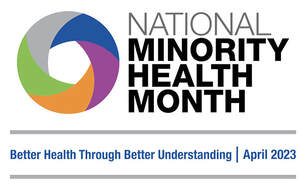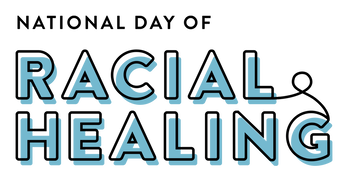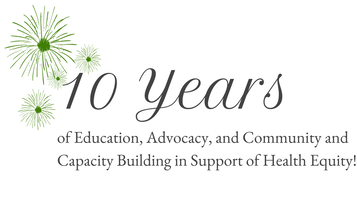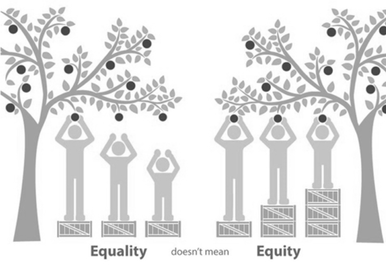|
If you are a professional or a writer who is passionate about health, racial, and social equity, consider contributing to our blog! Visit our Volunteer page to learn more. |
by Paige Hammond on behalf of Health Equity Initiative’s Board of Directors See if you are eligible to participate in HEI’s upcoming Advocacy Training on August 15, 2023, from 5-7 pm EST! With the generous support of Macy's Inc., Health Equity Initiative is holding an interactive training webinar for community leaders and CBOs to strengthen advocacy and policy communication skills and increase the reach of community-driven solutions in policy and institutional settings in support of health equity. As for all HEI’s activities, this training webinar will be highly interactive and participatory. We look forward to hearing about your work and co-designing solutions to meet your advocacy goals. Interested? Fill out this form if you and your organization would like to apply to participate in the August 15th training. The Advocacy Training will be open to a maximum of 25 participants who apply to be considered. Please note that the call for applications is only open to organizations with a budget up to $2,500,000/year from both the U.S. and international settings, as we seek to help raise the influence of community leaders and community-based organizations on health equity issues. For more information on Health Equity Initiative, please visit https://www.healthequityinitiative.org/
2 Comments
By Stephanie Shen  When discussing racial equity issues, it is well known that overt racism, like hate speech and hate crimes, directly negatively impacts the well-being of the racial diaspora that is targeted. However, what is often less discussed are the many implicit and insidious ways that continuous exposure to racism influence long-term negative outcomes. For example, Asian Americans are 60% less likely than non-Hispanic whites (1) to receive mental health treatment. Vietnamese Americans, Pacific Islanders, and Native Hawaiians are nearly three times less likely than white Americans (2) to reach out to mental health services when they need it. Southeast Asians are forced to independently pave their own way (3) to solving mental health issues due to their inability to find culturally informed healthcare providers. The barrier to accessing mental health care permeates into physical health as well. Moreover, the National Library of Medicine found that 57% of women from Cambodia (4) reported challenges in finding suitable medical care in the U.S. due to a lack of interpreters. by Paige Hammond on behalf of Health Equity Initiative’s Board of Directors  Join us in observing National Minority Health Month by connecting with relevant HEI resources and exploring dedicated resources to mark this month! At Health Equity Initiative, we are advocates for improved health outcomes for each and every group of people. This work includes uplifting groups who have been historically marginalized and underserved. This year, the theme for National Minority Health Month is Better Health Through Better Understanding. This theme highlights the importance of promoting health equity through improved health literacy and language access and reduced health disparities, specifically in historically marginalized communities. By Bree Bode, Gladys Pico-Gleason, Kameron Kempker, and Paige Hammond  In the United States, a variety of inequities present people of minoritized groups with roadblocks to healthcare and equitable health outcomes. When people, especially members of the Black community, experience multiple roadblocks they may feel discouraged to practice health seeking behaviors due to stress and medical mistrust (1). In fact, BIPOC communities have a greater number of people who have been historically marginalized and underserved, or are under- insured, than white communities (2,3). Compared to non-Hispanic whites, people of color continue to have poorer health outcomes (3). Black people living with heart disease, and American Indian and Alaskan Natives living with diabetes, experience higher mortality rates than non-Hispanic whites (3). As another example, quality of care is lower and pain management is less adequate among under-resourced minoritized groups (2). Posted by Paige Hammond on behalf of Health Equity Initiative's team. At Health Equity Initiative, we believe in the power and importance of racial healing. Racial healing and health equity go hand in hand, as it is necessary to recognize the consequences of structural racism and implicit bias in order to promote understanding, bridge gaps, stand in solidarity and create transformational change. The National Day of Racial Healing on January 17, 2023, provides the opportunity to reflect on this topic and commit to raising awareness in our own communities.
by Paige Hammond on behalf of Health Equity Initiative’s Board of Directors  “Equality is giving everyone a pair of shoes, Equity is giving everyone a pair of shoes that fits.” ~ unknown The fight for reproductive dignity, care, and autonomy is neither new nor singularly faceted. Inequities exist in health outcomes by a person’s sex and/or gender identity, which in turn impacts gender equity, a major determinant of health equity. These ongoing health inequities have been highlighted, especially in recent months. In fact, women are currently faced with significant adversity in relation to reproductive rights, which ultimately affects the health of all women, both physically and mentally. Women are experiencing ongoing attacks on their reproductive rights and are losing the ability to choose outcomes for themselves. This is in addition to other ongoing crises, such as the disproportionate rates of adverse maternal health outcomes within the Black community and other groups that have been marginalized - or experience disadvantage and bias - as the result of related health, racial, and social inequities. By Nicole Carberry  The COVID-19 pandemic has caused hardship and many stressful situations for young people in the United States. Amongst many other challenges, the mental health of many college-aged students has drastically been affected by the pandemic. College-aged students, between the ages of 17 and 22, have reported an increase in feelings of anxiety and depression since 2020. Main causes of such increase include social isolation as well as the health effects and the stress related to a long state of uncertainty. It is also difficult for many to receive adequate support from mental health professionals. Posted by Renata Schiavo and Radhika Ramesh on behalf of all of us at Health Equity Initiative  As we enter 2022 with the hope for an increased emphasis on advancing health equity in our society, we want to mark today the 6th National Day of Racial Healing, which takes place annually on the Tuesday after Martin Luther King Jr. Day, and seeks to bridge racial divides to transform our communities for our children and future generations. This national day of truth telling, dialogue, and collective purpose is part of the W.K. Kellogg Foundation’s Truth, Racial Healing and Transformation (THRT) efforts, and a much needed reminder on the importance of standing together against racism and promoting healing. by Tina Wong, Melanie Mc Dermott, Toni Lewis, and Renata Schiavo  In the United States, local governments play a key role in providing, promoting and regulating health services, economic advancement, education, land use and transportation, and safe neighborhoods with clean air and water. Even absent explicit discrimination, when that role is affected by implicit bias—the attitudes or stereotypes that unconsciously affect understanding and behavior—it leads to unequal access and unequal allocation of resources in these critical domains. The ability to vote, approvals of FHA loans, and access to quality education, greenspace and more, are just a few areas contributing to our overall health and wellbeing in which municipal bias continues to produce inequitable outcomes. Communities of color, low-income groups, people living with disabilities, LGBTQI+ groups, immigrants, and other marginalized social groups experience barriers to critical opportunities as a result. These inequitable outcomes are further reinforced by structural racism and other forms of social discrimination that exist in biased policies and practices in our local governments. Posted by Radhika Ramesh on behalf of all of us at Health Equity Initiative  Health Equity Initiative celebrated this very special milestone with its board members, team, partners, and its broader community at a virtual event on Dec. 9. We reflected on the many lessons learned during this remarkable journey, such as the importance of purposeful conversations with a community of people who share a passion for health equity, the necessity of always anticipating change without losing clarity of purpose and focus, the essential role of community and patient engagement in policy and intervention design, and the central role of trust in everything we do to advance health, racial, and social equity. |
Archives
June 2023
CategoriesEditors:
Renata Schiavo, PhD, MA, CCL Alka Mansukhani, PhD, MS Radhika Ramesh, MA Guest posts are by invitation only. |




 RSS Feed
RSS Feed
